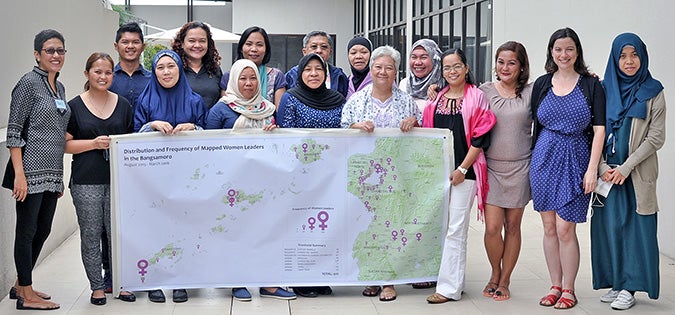Putting women at the heart of peacebuilding in the Bangsamoro, in the Philippines
Date:
Author: Nikita Blanes
Bangsamoro, The Philippines – Filipino women, civil society, and political institutions are working hard towards achieving sustainable peace in the Bangsamoro[1], in the Philippines. After a complex history of conflict, colonialisation, and a long struggle for independence, the Filipino and Moro people are fighting for gender equality and peace.

The Philippines, and the Moro people, suffered through colonisation by the Spanish during the 16th to 19th centuries, including in the Moro-Spanish wars. These events resulted in mass Christianisation, and disenfranchisement of the Moro people through discriminating land policies, violence and other atrocities. The United States (U.S.) took over the reign until 1898, when the Spanish American Treaty was signed. Land dispossession and violence towards the Moro people continued under American rule, and its effects can still be felt in the Bangsamoro today. On 15 October 2012, the Government of the Philippines and the Moro Islamic Liberation Front (MILF) signed the Framework Agreement on the Bangsamoro (FAB), aiming to end nearly four decades of intermittent violent civil conflict. The centrepiece of the FAB is the decision to create the Bangsamoro, a new autonomous entity in the Philippine region of Mindanao, and homeland for the Moro people. The new entity will replace the current Autonomous Region of Muslim Mindanao (ARMM). The FAB provided an overall framework for a final settlement and mandated further talks in the three complex areas of power sharing, wealth sharing and normalisation, in a manner that provides for the maximum level of autonomy allowable within the constraints of the current Constitution. After 17 months of negotiations, they agreed on crucial annexes pertaining to normalisation, wealth sharing and power sharing, forming part of the Comprehensive Agreement on the Bangsamoro (CAB). The peace process is a work-in-progress, with the creation of the Transitional Justice and Reconciliation Commission (TJRC) and production of its report. Integral to the work of the TJRC was ensuring the integration of a gender perspective in its processes and output, for which purpose UN Women appointed a gender advisor.
The Philippines’ peace process has been based on the foundations and global standards and norms set by United Nations Security Council Resolution 1325 on Women, Peace and Security, which recognises the importance of women’s meaningful participation at all levels of peace processes, and women’s roles as key agents in peacebuilding. The Philippines was the first country in Asia to develop and implement a National Action Plan (NAP) on Women, Peace and Security.United Nations Security Council Resolution 1325 sets the normative frame for women’s participation in peacebuilding and has been reflected in the CAB. The CAB yielded one of the most gender-sensitive provisions within negotiated peace agreements globally. These provisions in the CAB provide the backdrop for women’s participation – strengthening women’s demand these provisions are fulfilled - and encouraging women’s voices and leadership in the transition processes and in preparation for the establishment of the new Bangsamoro political entity. UN Women has worked closely with affected communities, women leaders and organizations in the Bangsamoro to support women as agents of peace.
UN Women ensures that women’s leadership and participation in peacebuilding in the Bangsamoro is anchored on women’s existing capacities, and looks for ways to support and strengthen those capacities. Research supported by UN Women revealed that no participants disagreed that peace is achievable in the Bangsamoro. A respondent from Basilan commented “With the peace process now, we may see many women like us who were consulted by different groups as to what we need to make our place peaceful.[2]” The research provided a snapshot of women’s perspectives and capacities on gender, peace and governance in the Bangsamoro, as the basis for future conversations and interventions for women’s leadership and participation.
UN Women have delivered capacity development to build skills for women in the community, and women want more. To ensure that the training supports the overall peace and development goals in the Bangsamoro, it is important to make sure there is not a gap between the macro-architecture of peace, (formulated by institutions and agreements), and what women respondents perceive as peace issues in their daily lives. This means that Moro women need to participate in defining peace. The backdrop for women’s leadership and participation has been established with the creation of formal peace institutions, and the Philippines’ adoption of a ‘Magna Carta for women’. Women now need to shape the kind of peace that they want for the Bangsamoro. UN Women and local partners are promoting and ensuring women’s leadership and participation in the transition process and in the new Bangsamoro institutions, and establishing capacity development interventions for women leaders and women’s groups and supporting their advocacy activities. Women in the Bangsamoro are realising their strengths and asserting their rights to create a path towards peace, and it is UN Women’s role to support them: “God willing, if all of us work toward peace, then we will surely attain it” said a local woman leader.
- Bangsamoro is a set of provinces, municipalities and villages being proposed as a new political entity in Mindanao. It is also an identity embraced by its people.
- Pir Alian. Final Report: Basilan.